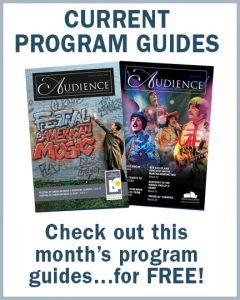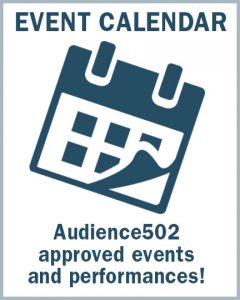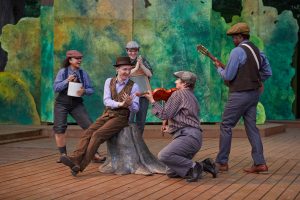 One of the signs of summer is when the crowds start filtering to Central Park for the annual Kentucky Shakespeare performances. On the brink of their 60th season, and potentially one of the first groups back on the stage after the COVID-19 crisis diminishes,
One of the signs of summer is when the crowds start filtering to Central Park for the annual Kentucky Shakespeare performances. On the brink of their 60th season, and potentially one of the first groups back on the stage after the COVID-19 crisis diminishes,
Audience publisher, Douglas Dreisbach, caught up with Producing Artistic Director, Matt Wallace, to hear more about this exciting season.
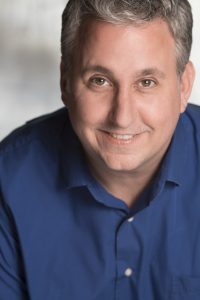 Douglas Dreisbach: What are your top roles and responsibilities as the Producing Artistic Director for Kentucky Shakespeare? Have any of those regular priorities changed since this situation happened?
Douglas Dreisbach: What are your top roles and responsibilities as the Producing Artistic Director for Kentucky Shakespeare? Have any of those regular priorities changed since this situation happened?
Matt Wallace: I handle both the artistic leadership and vision of the company, as well as the administrative and business part. I produce the summer seasons and also direct a lot of them, but also support the amazing work that our team is doing in schools and outreach programs. A lot of folks just know us as Shakespeare in the Park, and that’s an important part of what we do, but it is just a part of what we do.
Before all of this, we toured 97 counties and got in front of 71,000 kids in schools with our interactive arts programming. We also have community programs, like Shakespeare with Veterans and the Shakespeare in the Libraries tour and Shakespeare in the Parks. I’m a part of those programs, whether it’s overseeing it or providing the financial support or, for a lot of them, actually facilitating them and directing some plays.
DD: When you first heard about all this going on, what were some of your initial thoughts? And what do you think we will learn from it?
MW: One of the first things we did was meet with the various arts leaders. The Arts and Culture Alliance here in town is comprised of leaders of the different arts and culture institutions. I think the last in-person meeting I had was an executive committee meeting with Kim Baker, the Kentucky Center for the Arts, Aldy Milliken with KMAC and Alison Huff with Commonwealth Theatre Center and a few of the arts leaders. We talked about scenarios and also sharing how we were dealing with this and how we thought we were going to deal with this.
That is something that has turned into Zoom meetings with the arts leaders, with the recipients of funding through the Fund for the Arts and various circles of networks. I will say that sharing best practices and information has been really helpful. I think Kim Baker with Kentucky Performing Arts was a great example. They’ve really led the charge on how to communicate with their family and their audience members.
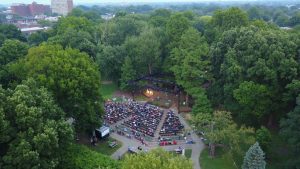 DD: Kentucky Shakespeare is offering several virtual options and opportunities to experience Shakespeare on your website at kyshakespeare.com. How are those going?
DD: Kentucky Shakespeare is offering several virtual options and opportunities to experience Shakespeare on your website at kyshakespeare.com. How are those going?
MW: Within that first week, we were dealing with this crisis management here, but figuring out how we could continue our mission even though we can’t be with people. We quickly realized that we had the past three seasons recorded. Abby Sage, our amazing videographer, has gotten pretty good getting the HD quality footage and the sound quality is good, too. We decided to do it and see how it went.
The first production was As You Like It from last summer, which I directed as a love letter to Kentucky. It featured original bluegrass music composed by Aaron Bibelhauser, and even when the doors closed on the set for the reveal, it was in the shape of the state of Kentucky. But I really thought, in the first week or so of dealing with this, we just needed to do this, to give this to our audience members and connect with them.
We set that up for Friday night Shakespeare, and then LEE Initiative wanted to partner with us on dinner and a show to support restaurant workers. The first weekend, we had about 12,000 people watch it. The comments were great and really kept us going. It reminded us what it felt like to get to perform our mission again — even though it wasn’t in person, to see people commenting from Japan and New Zealand, and then of course, all of our amazing local audience members — we were there. And even though it was on video, just hearing the cicadas and the cheer of the audience and the laughing — for us, it really brought us all back, just for a couple hours, to share this magical experience of a much simpler time.
We decided to start doing it every Friday night, and we are still seeing several thousand people watch it each weekend. We have also moved several of our programs to Zoom and other interactive scenarios including the popular class for adults, called “Off the Page with Gregory Maupin.”
DD: How are your performers staying prepared knowing there is a possibility of being postponed even more?MW: I have been working on this season for nearly a year now. We started meeting with our designers in January from a design and a directing aspect with Amy Attaway is directing Henry V, and me directing Shakespeare. Our designers are moving forward with concepts, designs and logistics. We finished hiring all of our staff, so we have about 60-65 people contracted for the summer.
One of the first preemptive decisions we made was to move our opening from May to June. With so many people involved, we really wanted to work to take care of people and to give them as much notice and let them know about opportunities for relief. We only had the delay for two weeks, but we did make the decision to pull our third show, Merry Wives of Windsor, out of summer season to allow for some further flexibility as we needed. We communicated with all of our summer staff to continue to work on your scripts and prepare because as of now we are planning to start rehearsals in mid-May if we can.
I have many different scenarios that could still allow us to produce a summer season. Right now, we’re on Plan B, and my list goes to the letter M! Right now, the season is scheduled to go through August 9th, so we’re looking at all of the options. We fully understand that some of the decisions will be made for us, because we are in a Metro Park, and it is a Metro-permitted event, so that will dictate some of that.
The next priorities we are looking at will be when we can start assembling in smaller groups because that is what our rehearsal process would look like. We are ready to be flexible and determined to work to produce a 60th summer season. It might look different. The dates might be different than what we originally said, but we really feel, when we can get through this, we’re going to need to come together for these shared arts experiences. And when we can do so safely, it’s going to mean more than it ever has.
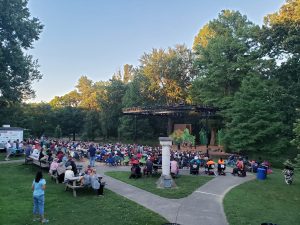 DD: There is a chance that Kentucky Shakespeare might be the first live arts event once we get through this, creating what is probably the highest-anticipated performance ever. How are you using that as a motivation to continue to grind through this time, to make sure you’re prepared for that?
DD: There is a chance that Kentucky Shakespeare might be the first live arts event once we get through this, creating what is probably the highest-anticipated performance ever. How are you using that as a motivation to continue to grind through this time, to make sure you’re prepared for that?
MW: That is helping us be vigilant in this time and certainly keeping us motivated. Just to be able to picture, to envision, what that could be like, when we can get back, to be able to serve people with this free professional public event, and how important it’s going to be, how much we are all going to need that to heal. That is what I keep thinking about. And that is what helps get us through the more challenging and darker times.
DD: What is the best way for patrons and supporters of the arts to support Kentucky Shakespeare?
MW: Without this pandemic, this is normally a big fundraising time for us, so it is an extra-important time for us. We are working hard to keep our artist educators employed and working on envisioning the future. We’re currently accepting donations on our website at kyshakespeare.com/donate. Our goal is to have donations in by May 15th to be able to acknowledge them in the Audience program guides.
DD: What are you doing to relax and unplug in your free time?
MW: I have been spending a lot of time with my family. We like to do art projects, go on walks and bike rides and cook. I think my weekends, even more so now, have been extra special and needed.
DD: Is there anything you’re doing now that you were forced to do because of the situation, that you weren’t doing before, but you will continue to do after this is over?
MW: I would have to say taking even more time with my wife and children. We have been doing a lot of art projects, and I hope we continue to do those, as well as just making sure that the time we do get to spend together is really quality time.
DD: Are there any there any restaurants or takeout places that you have been going to that you would like to give a shout-out to?
MW: We are still working our way through the Louisville restaurant scene and trying to do our part to help out by getting takeout every few nights. We live close to Oscar’s Slider Bar, and we’ve gotten takeout several times from them. They’re steps away, and we found out Friday night that they have takeout cocktails in a little bag, so we had a little nice family date night watching our Shakespeare in the Park with Oscar’s. We also learned the Celtic Pig, one of our summer food trucks, is actually going to be stationed down at Bardstown Road and Gardiner Lane, so we will be frequenting there as well.
To support Kentucky Shakespeare, visit kyshakespeare.com/donate


